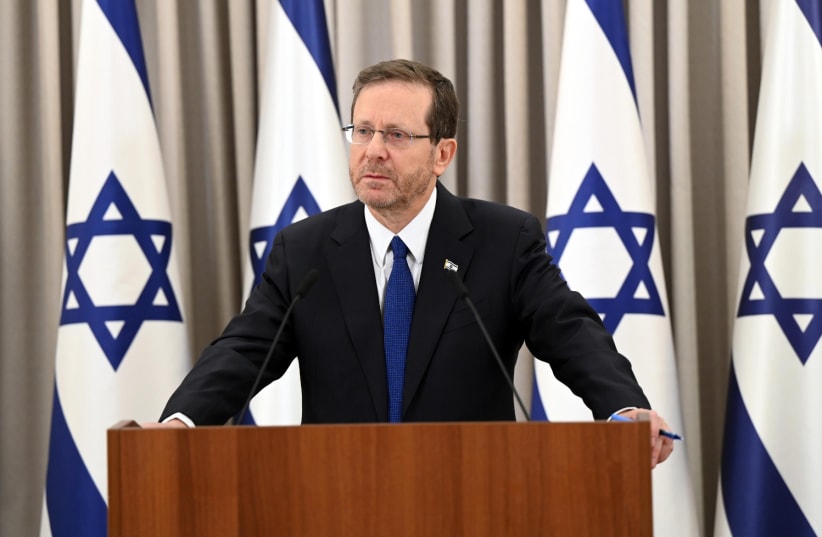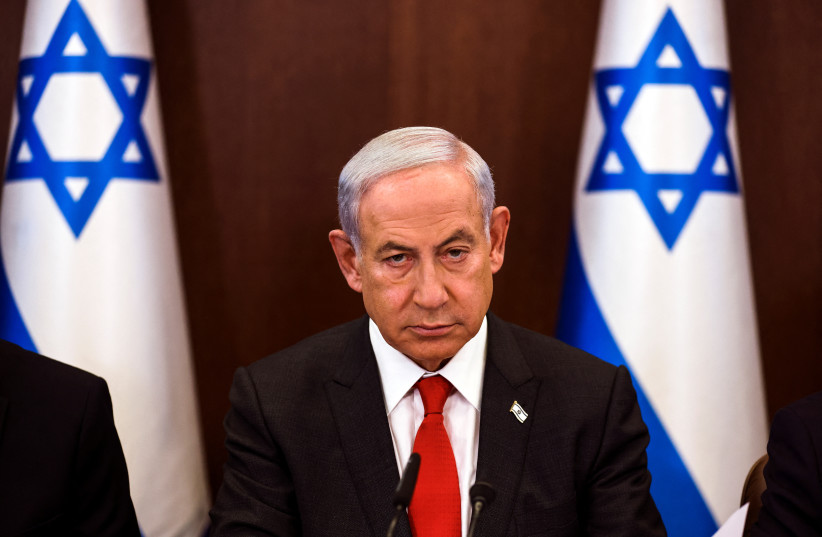Halt the legislative process regarding the judicial reforms in order to arrive at a compromise based on a five-point plan, President Herzog said in an impassioned speech on Sunday evening.
The president began the speech, which he announced earlier on Sunday as being a "special address," by explaining his motivation to give the speech, as well the pain that all sides of the dispute were feeling.
"The shocking and painful Israeli reality has brought me in recent weeks to comfort families who lost their loved ones in the wave of criminal terrorism. Family after family, from all parts of Israeli society, looked at me with tearful eyes and asked me - please. From the bottom of the heart and with a cry: they asked not for themselves nor for their grief, but to do everything to stop the madness, the controversy that threatens us all.
"These dear families joined the voices of millions, from all sides of the political map, who asked for one thing in the last few weeks - not to fall into the abyss; to stop the flammable fire of polarization, before it consumes us. We are no longer in a political debate, but on the brink of constitutional and social collapse," the president said.
Herzog said that he "saw the protests throughout the country," calling the protestors "an immense group of patriots who are using their right to demonstrate … and are completely dedicated to the destiny of the state and its people."
On the other hand, Herzog acknowledged the "pain and deep frustration" of an entire political camp, which came to a head during the Disengagement from Gaza and northern Samaria in 2005.
"This pain of our brothers and sisters is real, to reject it or ignore it is a big mistake," the president said.
However, the responsibility to hear all sides' pain lay at the government's feet, and Herzog said that he believed that "the totality of the parts of the reform in its current form raise deep concerns about their potential negative impact on the democratic foundations of the State of Israel."
Israel's courts are one of the country's "glories," the president said. The courts "safeguard society and the state" against crime and international prosecution of IDF soldiers, but also against the loss of "the fundamentals of justice, law and morality," he said.
The Jewish Diaspora and supporters of Israel across the world were concerned about the direction the state was taking – and intelligence reports are that the state's enemies are "gleefully rubbing their hands" while Israel implodes from within.
"Is there any greater stop sign than that?!" he asked.
The president then presented the plan's five points:
- First, legislate a Basic Law: Legislation, that anchors the special status of Basic Laws and includes a special legislative process that includes wide agreement so that they will not be used for any purpose. The High Court then will not be able to hear cases on basic laws. Regarding regular laws, the court will have the power to cancel laws that contradict basic laws, but the Knesset will have the ability to override these in a mechanism to be negotiated between the sides.
- Second, come up with a broad plan, already in the upcoming budget, to decrease the immense workload of the courts, which leads them to be ineffective and for cases to drag on for years.
- Third, come up with a national plan to restore trust in the judicial system for those who lost it.
- Fourth, change the Judicial Appointments Committee so that it will include representatives from all branches of government as well as public representatives that are agreed upon by both the justice minister and the High Court of Justice chief justice. This, without giving any one of the branches complete control or an automatic majority.
- Fifth and finally, to define the Reasonableness Clause by negotiation such that it is not canceled completely but also restrains the courts from using it unnecessarily.
Herzog concluded his speech by requesting that the legislative process halt so that the sides could begin negotiations on the basis of these principles.
"Citizens of Israel, I would like to conclude my words by thanking you, all the multitudes of people who have contacted me in recent weeks. To everyone who took part, suggested, and pushed. The spectacular Israeli mosaic is the secret of our strength. Israeli diversity leads to controversies. Conflicts and arguments cannot be denied, but since time immemorial we have known to give more space to what unites us. We knew how to be smart and see that the distance between us is the distance of reaching out a hand. The time has come to lend a hand," the president said.
"Citizens of Israel, I would like to conclude my words by thanking you, all the multitudes of people who have contacted me in recent weeks. ... Conflicts and arguments cannot be denied, but since time immemorial we have known to give more space to what unites us. We knew how to be smart and see that the distance between us is the distance of reaching out a hand. The time has come to lend a hand."
Isaac Herzog
A dramatic week awaits the Israeli government
The president's speech comes right before a dramatic day on Monday, when the coalition will begin voting on the first provisions of the reform while tens of thousands of people will demonstrate outside of the Knesset.
Herzog has been acting behind the scenes for weeks in order to bring the sides to the negotiating table, and proposed a plan on February 10 in which the government would halt the coalition's legislative process in order for the supporters and detractors of the reform to meet and begin negotiations at the president's residence.
Justice Minister Yariv Levin already rejected Herzog's plan on Channel 13 last week, saying that he would not halt the legislation "even for a second."
Levin again responded to Herzog's proposals in a statement on Sunday evening: "There are positive elements in his proposal, and there are also elements that perpetuate the existing abnormal situation. As I've said all along, I'm ready and interested in holding real talks with opposition members who agree to it, and we should start this right away."
"In order for the negotiations not to become a means of foot-dragging to delay and prevent a fundamental and significant reform of the judicial system, the negotiations should not be linked to the progress of the legislative proceedings. Along with advancing the legislation, we all have enough time to be able to talk and reach understandings before the second and third readings," Levin's statement conluded.
Opposition leader MK Yair Lapid wrote in response, "President Herzog proposed a worthy arrangement: immediately stopping the legislation before the first reading as a condition for any dialogue; the debate will happen at the president's residence as part of a presidential committee; the president's five points will serve as the basis of the plan.
"Until then: the fight will not stop, the demonstrations will not halt. We are fighting for the values of the Declaration of Independence, and the very idea of a joint existence and us being one people," Lapid said.
National Unity chairman and former defense minister MK Benny Gantz wrote on Twitter, "I strengthen the president over his important words. My colleagues in National unity and I are willing, as we announced, to [enter] a dialogue of agreements on a true reform whose base is non-politicization and maintain the independence of the judiciary branch and the array of legal advisors, legislating a broad Basic Law: legislation, and treating problems that will provide solutions for the needs of the public and not for the whims of politicians. If the legislation stops and we are all invited to the president's residence for true dialogue, we will be the first to come."
Other members of his party, including former justice minister MK Gideon Sa'ar and former religious services minister MK Matan Kahana had similar responses.
High Court Chief Justice Esther Hayut did not immediately respond, nor did Netanyahu, who during the speech was still in a security cabinet meeting.
The planners of Monday's demonstration responded, "A speech from the depths of the president's heart, who understands the depth of the pain that comes with a dictatorship." The planners said that they were continuing forward with Monday's demonstration, "until the dictatorial coalition announces that it is completely rescinding its threat to ruin Zionism and democracy."
Final preparations were conducted on Sunday ahead of Monday's mass strike and protest outside of the Knesset.
Organizers said in a statement on Sunday that over a million people were planning on striking, and another million supported the cause. Over 50 convoys of vehicles will head to Jerusalem, along with hundreds of buses, the organizers said. The events will begin at 10:00 a.m. with a prayer at the Western Wall, and then shift to the streets outside the Knesset beginning at 12:00 p.m. and continuing throughout the afternoon. People who committed to coming include thousands of doctors, hundreds of hi-tech companies, hundreds of law offices, university students and staff, high school students, and many other groups from "all branches and sectors," the organizers said.
A right-wing organization in favor of the reform will also be held, hosted by an NGO called "Betzalmo" outside of the High Court. The right-wing protest was initially not allowed by the police, but National Security Minister Itamar Ben-Gvir intervened in order for it to be allowed. They will hold signs reading "the High Court is a dictator"and "stop the tyranny of the minority."
The following streets will be blocked off:
- Eliezer Kaplan street between Rupin Street (Hakhor Square) and Agrand Square (Rabin Street)
- Rothschild St. between Yitzchak Rabin Blvd. and the Knesset building- Nahasi Hashishi street between Yitzchak Rabin Blvd. and the State Comptroller's Office
- Rupin Street between Hazaz-Ben Zvi Street and the Yitzchak Rabin Blvd. and Netan'el Lorch intersection.
As a result of these blockades, there will likely be traffic congestion in the surrounding area.

